This article was originally posted on ILTA.
What is a force majeure clause?
All weekend your company has received messages from its customers and suppliers stating that, due to the impact of COVID-19, they will not be able to honor their contracts. First thing Monday morning, the CEO relates this information and says that the customers and suppliers all claimed that their “force majeure clause” meant that they could withhold performance. The CEO asks you, “What is a force majeure clause?” and “Do we have those in every contract?” Your immediate response to the CEO’s first question is a version of: “it depends” or “it’s not so simple.” You know it will take time to determine which of your company’s contracts contain force majeure clauses and analyze whether COVID-19 and related actions qualify as a force majeure event.
BakerHostetler, a national law firm, QuisLex, a leading legal services provider, and eBrevia, a DFIN Company, which offers an AI-powered contract analytics solution, joined forces to help you better prepare for this moment. Using a scenario driven by the actions taken in response to COVID-19 as an example, and leveraging their unique expertise, they prepared this white paper to:
- Provide an overview of the legal considerations regarding force majeure clauses and excuse of contract performance.
- Present findings from an AI-powered review of force majeure provisions across a broad set of contracts from the last 20 years, providing examples of the data extracted and insights you can use.
Force Majeure Explanation and Examples
A force majeure clause is a contract provision that may excuse one party’s failure to perform in the event of certain circumstances. Force majeure clauses are commonly included in commercial contracts to provide the parties flexibility should conditions change between the time the contract was formed and the time of performance such that one party cannot perform its obligations. These clauses do not excuse performance for ill-made assumptions about future events or changes in pricing or economic conditions that make performance difficult or economically disadvantageous. Rather, the trigger is usually an event or circumstance that is unforeseeable and completely outside the control of the party claiming the relief.Force majeure clauses are generally comprised of four elements:
- definition of what is a force majeure event (typically through exemplary lists);
- identification of what is excused;
- conditions to exercising relief; and
- remedies upon the occurrence of a force majeure event.
Using AI to Get Answers
eBrevia’s AI-powered contract analytics software allows you to quickly and efficiently analyze a large number of contracts to determine which contracts contain force majeure clauses and other relevant contract provisions. eBrevia’s easy customization allows you to adapt the search and data collection process, giving you the ability to identify and extract specific language that is most applicable to your particular needs.In this example, Quislex, eBrevia, and BakerHostetler examined force majeure language in a sample of 171 publicly available contracts entered into over the last 20 years. The study results are not exhaustive and serve only to demonstrate how tech-savvy law firms, other service providers, and corporations can use eBrevia’s software to quickly pull information relevant to decision-making from their own contracts to fulfill a variety of needs, including responding to claims of force majeure during the COVID-19 pandemic.
The sample population included a variety of agreement types, industries and years, as represented in the figures below:


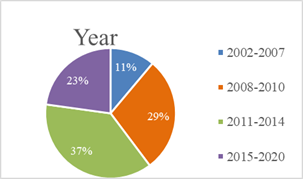
Is the Force Majeure Clause Triggered?
In defining a force majeure event, parties may describe the type of circumstances (e.g., “unforeseen events beyond the reasonable control of the party”) and often include a list of qualifying events. Force majeure clauses commonly include the following events: acts of God, actions of government, natural disasters (fires, floods, earthquakes, and hurricanes), wars, acts of terrorism, strikes or lockouts, and power or material shortages. Catch-all phrases may be included to capture other events or circumstances not specifically identified. Understanding the law of the jurisdiction governing the contact is crucial. Courts in some jurisdictions interpret these phrases narrowly to include only those events that are similar to the events specifically listed.For the sake of this paper and in light of the COVID-19 pandemic and response, we chose to focus on the following three categories of trigger events commonly reflected in force majeure clauses: (i) “government action”; (ii) pandemic-specific language (e.g. “pandemic,” “disease”, or “epidemic”); and (iii) “acts of God.” Our decision was guided by the world-wide events occurring in the wake of the spread of the COVID-19 virus, including the World Health Organization declaring COVID-19 a "pandemic" on March 11, 2020, and government actions instituted as a response such as forced quarantines, business closures, and travel restrictions. We included the general reference to an “act of God” as that is a common expression in force majeure clauses and could be the basis of a claim where more specific language does not exist.
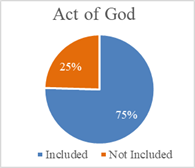
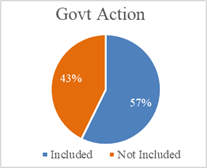
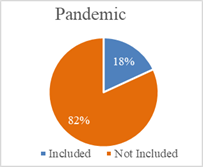
Seventy-five percent of the force majeure clauses reviewed contained a reference to the “act of God” concept. On the other hand, reference to government action appeared in 57% of the clauses, and pandemic-specific language appeared in 18% of the clauses. One note is that, while compiling the results, we took a conservative approach on whether the force majeure clauses covered these categories, with an aim of removing as much subjectivity from our review as possible.1 Depending on the circumstances, legal counsel may wish to identify other relevant language.
We found relatively consistent results across both industry and agreement types:
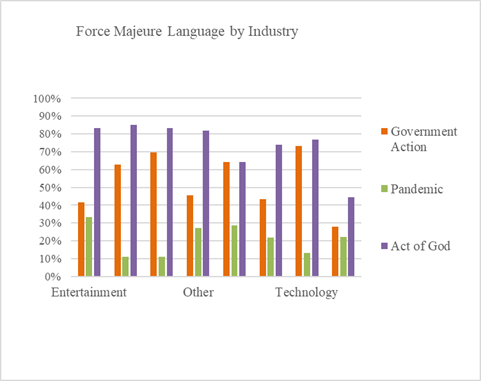
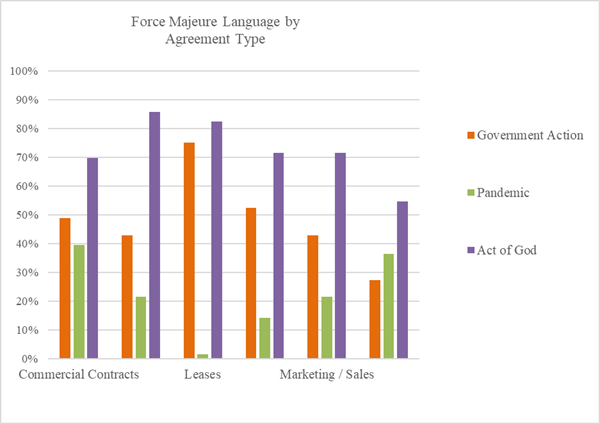
There were a few notable exceptions: (i) leases had the lowest instances of pandemic-specific language with only one instance out of the sixty-eight lease samples (1.5%), and (ii) utilities had the lowest instances of both “government action” (28%) and “act of God” (48%). These percentages were 57% and 75%, respectively, in the overall sample set.
We note that our sample revealed a general increase in the inclusion of pandemic-specific language in force majeure clauses over the past 18 years.2
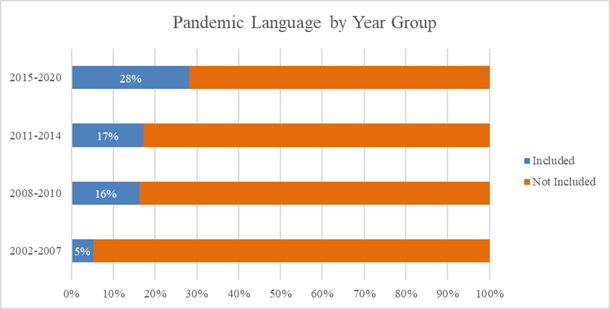
What is Excused?
Force majeure clauses generally excuse performance by the party impacted by the force majeure event. In most jurisdictions, it is the nonperforming party that bears the burden of proving that the event was beyond the party's control and without its fault or negligence. The breadth of what contractual obligations are excused, however, is not always clear. The parties may debate what performance is required, if any, and whether the entire contract is essentially null and void. Those answers depend in large part on the contract language and the law of the jurisdiction governing the contract.Note that parties also must consider other defenses to performance that may impact the rights of the parties in the event of a force majeure-like event, whether or not the contract’s force majeure provision covers such an event and even where the contract does not include a force majeure provision. For contracts involving the sale of goods, under the Uniform Commercial Code (UCC), suppliers may raise the doctrine of excuse.3
Other defenses a non-performing party may raise include the common law doctrines of impossibility and frustration. Under impossibility and frustration, similar to the UCC, a party is excused for performance because of the occurrence or non-occurrence of an event contrary to a basic assumption of the contract. Unlike the UCC, however, under impossibility and frustration, the party failing to perform does not have an explicit obligation to allocate resources or give prior notice of its expected non-performance. Because these doctrines are part of a state’s common law, case law may impose these and other obligations before asserting such a defense.
Conditions to Exercising Relief
Standard force majeure clauses require the impacted party to (i) give notice, usually within a certain period of time after the occurrence of a force majeure event; (ii) provide detail regarding the nature of the force majeure event and anticipated duration; and (iii) mitigate the impact and duration of the force majeure event, often including partial performance.Remedies Upon the Occurrence of a Force Majeure Event
Assuming the trigger event occurred, the most common remedy is the other party’s right to terminate the contract, sometimes after a specified period of time. Alternative remedies may include the right to adjust or otherwise modify the impacted party’s performance or the right to temporarily obtain goods or services from an alternative source.We reviewed each agreement to determine how often a party had a right to terminate an agreement based on a force majeure event.4
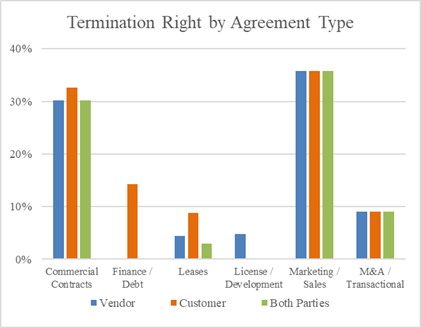
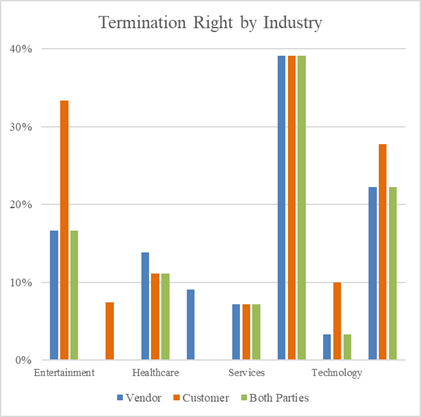
Across agreement types, our results showed that those reliant on delivery or performance, such as commercial contracts and sales agreements, had the highest occurrence of termination rights for force majeure events. In contrast, leasing, licensing, and finance agreements had a much lower prevalence. The results across industries showed similar results. Contracts in the supply chain, such as logistics and manufacturing companies, had a significantly higher occurrence of termination rights for force majeure events at just under 40% for both contract parties (compared to 12% for the entire sample).
The number of days a force majeure event had to continue before this termination right was triggered varied widely:
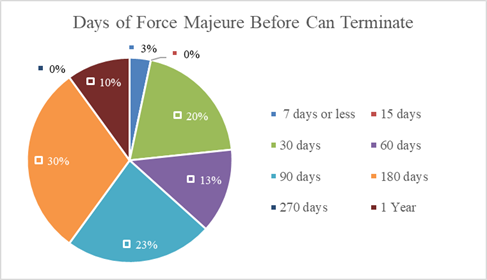
The longest period was one year while the shortest was seven days. Across all agreements, the average was 119 days and the median was 90 days.
Conclusion
To slow the spread of the global pandemic COVID-19, governments and organizations around the world took drastic and unprecedented actions to limit social activity, which of course is having a significant economic impact. The governmental limitations and resulting economic impact put many companies in a position in which they were either unable or unwilling to fulfill their contractual obligations. Predictably, lawyers advising these companies raised force majeure as a potential defense for any non-performance. Either in anticipation of this defense or in response to a counterparty’s assertion, lawyers advising companies on the other end of the transaction wanted to assess the total risk of force majeure, many times across different types of contracts and industries.For larger organizations with tens of thousands of agreements, quickly reviewing existing contracts for force majeure without the aid of an AI solution or tech-savvy service providers may be inefficient. Law firms, such as BakerHostetler, and legal process outsourcers, such as QuisLex, can leverage eBrevia’s AI solution to help clients navigate these uncertain and challenging circumstances in a quick and cost-efficient manner.
About Baker & Hostetler LLP
Recognized as one of the top firms for client service, BakerHostetler is a leading national law firm that helps clients around the world address their most complex and critical business and regulatory issues. With six core practice groups – Business, Digital Assets and Data Management, Intellectual Property, Labor and Employment, Litigation, and Tax – the firm has nearly 1,000 lawyers in 16 offices in the United States. BakerHostetler is widely regarded as having one of the country’s top 10 tax practices, a nationally recognized litigation practice, an award-winning data privacy practice and an industry-leading business practice. The firm is also recognized for creating an industry-leading IncuBaker team dedicating to helping lawyers and clients understand and navigate the intersection of digital business, emerging technologies and the law. For more information, visit bakerlaw.com.
About eBrevia
eBrevia, a DFIN company, is a leading provider of AI-powered data extraction and contract analytics software. With the most precise AI in the industry, our software reduces document review time by 30-90%. Corporations, law firms, audit/consulting firms, financial institutions, and commercial real estate firms leverage the software for due diligence, tracking contractual obligations and risks, compliance and lease abstraction. In December 2018, eBrevia was acquired by DFIN, a leading global risk and compliance solutions company that provides domain expertise, software and data analytics for every stage of clients' business and investment lifecycles.
About QuisLex
QuisLex is an award-winning legal services provider that specializes in managed document review, contract management, compliance services, legal spend management, and legal operations consulting. Our full-time highly trained attorneys, process experts, legal technologists,
statisticians and linguists work closely with our clients to reduce cost, mitigate risk and maximize efficiency. QuisLex is regularly acknowledged as a leader in the legal services industry, and is proud to be recognized by the ACC as an ACC Value Champion, Chambers and Partners as a Band 1 Legal Process Outsourcing Provider, New York Law Journal as a Top Managed Document Review Services Provider, and the IACCM as its Outstanding Service Provider for contract management solutions. To learn more, visit www.quislex.com.
1 For example, when determining whether to flag a positive response to “government action,” we included phrases related to “intervention by a government entity” and “any action of civil or military authority,” but did not include references to “national emergency”, “government restriction”, “civil commotion”, or “national or international calamity”.
2 This sample included six agreements from 2020 (of which three agreements had such pandemic-specific language), with the last agreement dated February 28, 2020. Consequently, it is possible that COVID-19 may have had a small effect on these results.
3 Under the UCC, business-to-business sellers can avoid breach for non-delivery or delayed delivery if performance is made impracticable due to the occurrence or non-occurrence of an event contrary to a basic assumption of the parties or because of a government regulation or order. In the current situation, suppliers may claim, for example, that a significant amount of their workforce is infected with COVID-19 and, therefore, they have limited production capacity, or that state lockdown orders have prevented their workforce from reporting for duty. Under the doctrine of excuse, business-to-business sellers cannot simply fail to perform, however. The UCC requires that they allocate production and deliveries among their customers to the extent possible. Sellers must then notify their customers in a timely manner that they will not be able to deliver as required under the contract and also inform them of any allocated quota they are able to deliver. Most states have adopted the revised UCC, but parties should check the relevant UCC in the state identified as the governing law of the contract.
4 These results only cover explicit termination for a force majeure event, excluding “termination for convenience” clauses generally.
5 We did not include any separate notice period before the termination became effective (e.g., if a party had a termination right after 30 days, but then there was a 30-day notice period before could terminate, our result would show 30 days, not 60 days).